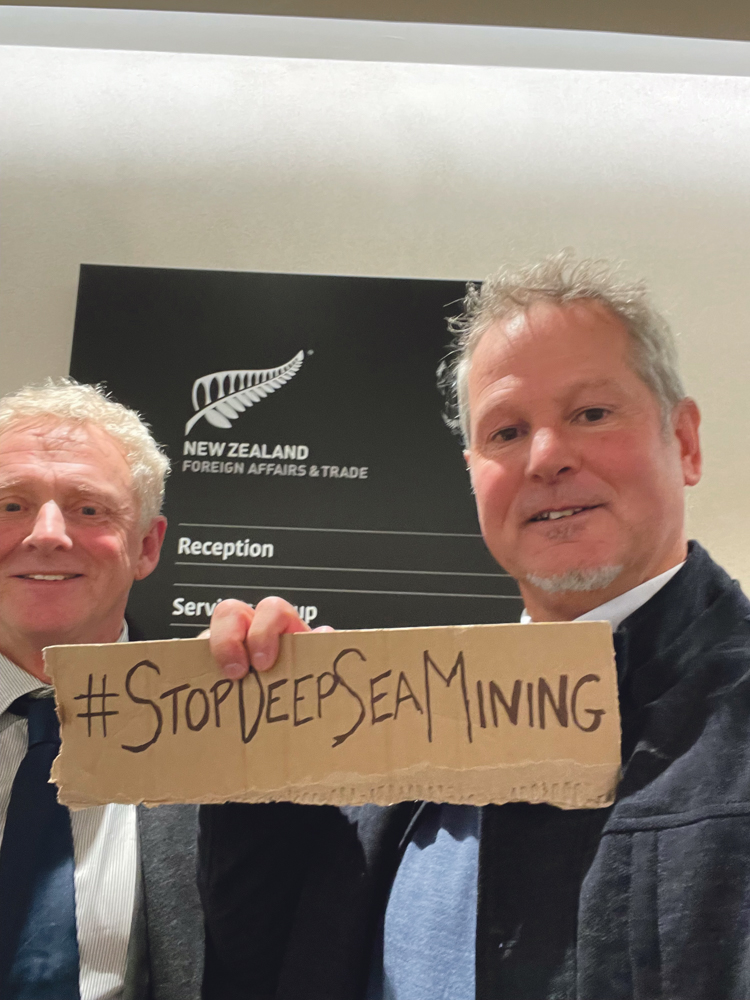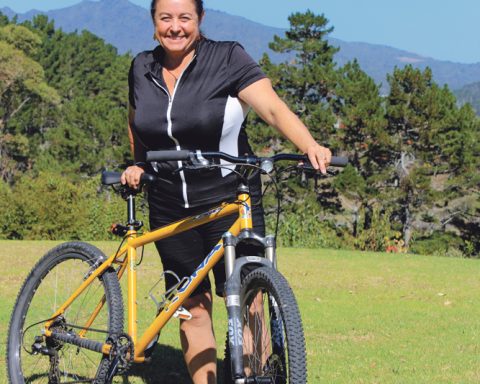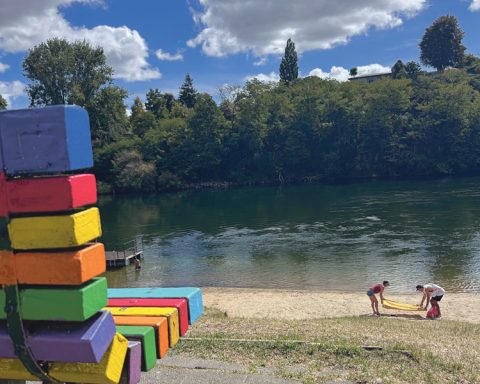Phil McCabe phoned in to Raglan Community Radio from Lisbon on Monday, October 31, to celebrate the New Zealand government’s decision to back a conditional moratorium on deep sea mining in international waters. As the Pacific Lead for the Deep Sea Conservation Coalition (and former KASM Chair) Phil has been meeting with Minister Nanaia Mahuta over the past few years and is stoked about the New Zealand government’s position.
He’s currently traveling around the world to attend a series of UN meetings around deep sea mining and says there has been a ‘political shift’ in recent months with the likes of French president Emmanuel Macron flying to the Lisbon UN event to call for a stop on deep sea mining. Phil also says they have the support of former Prime Minister Helen Clark after having a quick chat with her while he was in New York, where she expressed deep concern about the governing body which manages the seabed of international waters for all of humankind.
While the world may be teetering on the brink of a potentially irreversible cascade of climate tipping points that threaten our very existence, the mining industry has its sights set on digging, dredging and vacuuming up the ocean floor in pursuit of deep sea minerals.
Phil says that deep-sea mining would wreak enormous damage and a moratorium is needed to assess the full impact before a new environmental crisis is created.
Last week the New Zealand Government announced it would back a conditional moratorium on deep sea mining in international waters saying that this moratorium will remain until strong environmental rules, backed by robust science, are in place.
This decision comes amid a review on a regulatory process to control deep sea mining in the area managed by the International Seabed Authority (ISA), the autonomous organisation set up by the UN that has been mandated to oversee the world’s deep-sea resources “for the benefit of mankind as a whole.” These seabeds include areas beyond exclusive economic zones and extended continental shelves.
The ISA has a July 2023 deadline to complete the regulations, or Mining Code, before mining applications can be submitted. If it is unable to do so, the ISA is required to allow mining contractors to begin work under whatever regulations are in place at the time.
Mahuta said the government is not confident a robust regulatory framework for deep sea mining can be agreed by next year’s required deadline.
Countries such as Palau, Samoa, Fiji and Federated States of Micronesia have been calling for a moratorium since June this year and New Zealand joins a growing group of nations supporting the international moratorium.
“If you don’t know what exists, then you don’t know what you’re breaking,” said Phil, pointing out that the scientific knowledge simply does not exist for the mining companies to be able to describe the impact.
There is currently a big push coming from mining companies to open up a huge area in the Pacific Ocean to deep sea mining – an area that spans from Hawai’i across to Mexico and down to Kiribati.
The ISA has already issued 17 exploration permits covering a staggering 1 million sq kilometres of the Pacific Ocean and if even one of these mines gets the go-ahead then that mine would be larger than any other mine site in the world.
Deep-sea mining is hugely disruptive to the environment. Mining would create huge sediment plumes deep in the ocean that will drift on currents, smother marine life and potentially kill species we have not even discovered.
The tailings and waste from dredging the ocean floor would be dumped back into the mid-water column of the ocean, potentially impacting more sea life, such as tuna, as the waste water would contain metal fines and may contain other toxic sediments that could be dangerous to the ecosystems it travels through.
This whole process could also disrupt the ocean’s natural ability to capture and sequester carbon at vast levels and could release greenhouse gases from the sea floor, potentially accelerating climate change.
“Deep sea currents in this area are slow and the sea life there isn’t accustomed to disturbance and sediments. It’s a fragile ecosystem,” says Phil.
The mining companies’ justification for mining is that we need deep sea minerals for electric car batteries and the transition to green energy. They are looking to extract polymetallic nodules from the seabed. These nodules, which resemble potatoes and take millions of years to form, are rich in manganese, nickel, cobalt and rare earth metals, key components of batteries for the current generation of electric vehicles. Recent developments in technology however have shown that newer, longer-lasting batteries can be made without using deep sea minerals.
Also concerning is the influence these mining companies have on the ISA, a somewhat secretive organisation based in Jamaica that oversees half the planet’s seabeds. Some of the ISA’s processes are murky and opaque and have resulted in some questionable deals with selected mining companies.
As an example, Phil points to the ISA’s approval of Nauru Ocean Resources Inc, (a subsidiary of Canadian firm The Metals Company) to pilot its extraction of 3600 tonnes of metal-rich “nodules” from an area of international seas despite their original application being declined due to a subpar environmental impact statement.
Phil describes the Secretary General of the ISA as “off the planet” and says that the ISA’s behaviour is upsetting a lot of countries that care about good governance. Green Party oceans spokesperson Eugenie Sage also describes the ISA as, “Not fit for purpose if it’s granting these large-scale, trial mining applications before it’s finalised its [regulatory] regime and without any robust process.”
Looking forward to the next step in their campaign, Phil and his team at the Deep Sea Conservation Coalition are keen to see investment into independent research for deep sea knowledge.
He also says that more support needs to be given to Pacific people to develop their own knowledge but also to support them to be economically sustainable without relying on deep sea mining in their waters.
The proposed moratorium doesn’t apply to New Zealand waters; however, a private members bill by Debbie Ngarewa-Packer of the Maori party, that seeks to ban seabed mining in the New Zealand Exclusive Economic Zone (EEZ) has been drawn from the ballot and is awaiting its first reading in parliament.
“Given the government’s bold stance on seabed mining in international waters, it bodes well for similar action in our own waters. Something that we in Whaingaroa have been pushing for, for many years”, says Phil.
As this article went to print we heard from Phil, reporting live from an ISA meeting in Lisbon, saying that the ISA secretariat attempted to limit Non-Government Organisation and scientific participation in the regulatory process for the Mining Code but this was met by strong pushback from New Zealand which resulted in the secretariat dropping the attempt to limit participation. Along with this pushback, Germany, Spain, Costa Rica and Panama have all called for a precautionary pause on deep sea mining – in essence a moratorium – until there is robust science available.
This content has been provided thanks to the Raglan Community radio visit raglanradio.com for local news, information and music!











